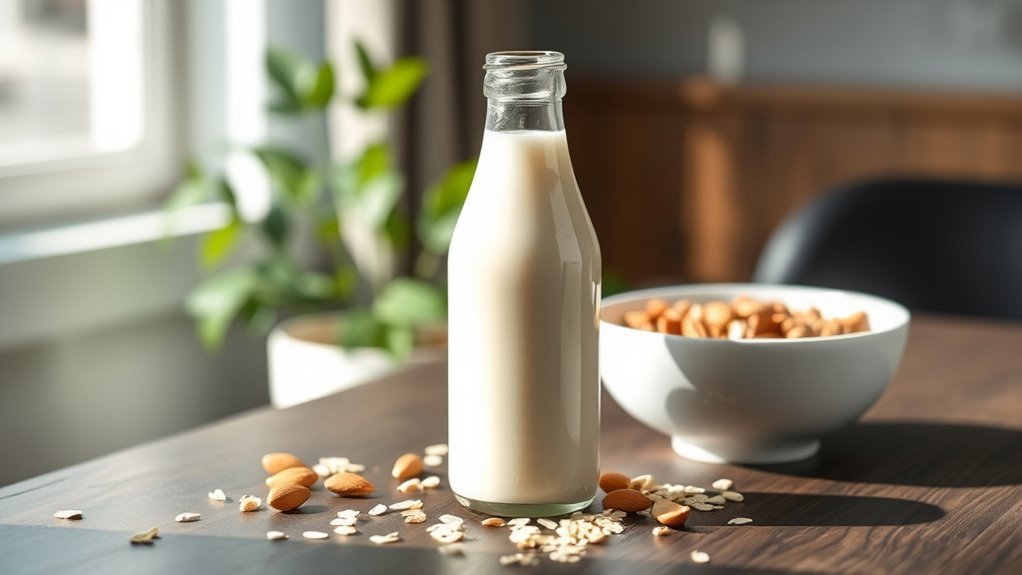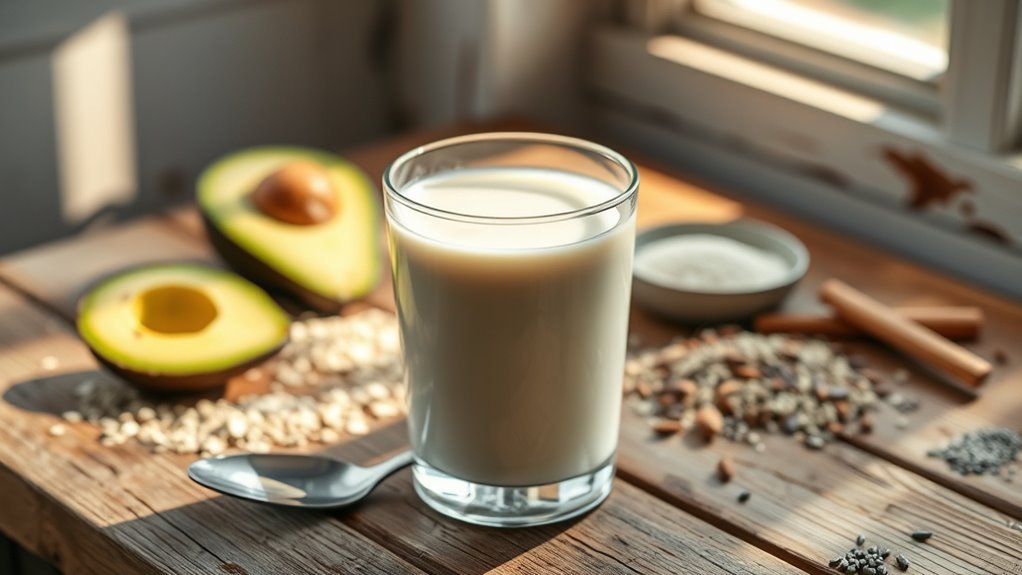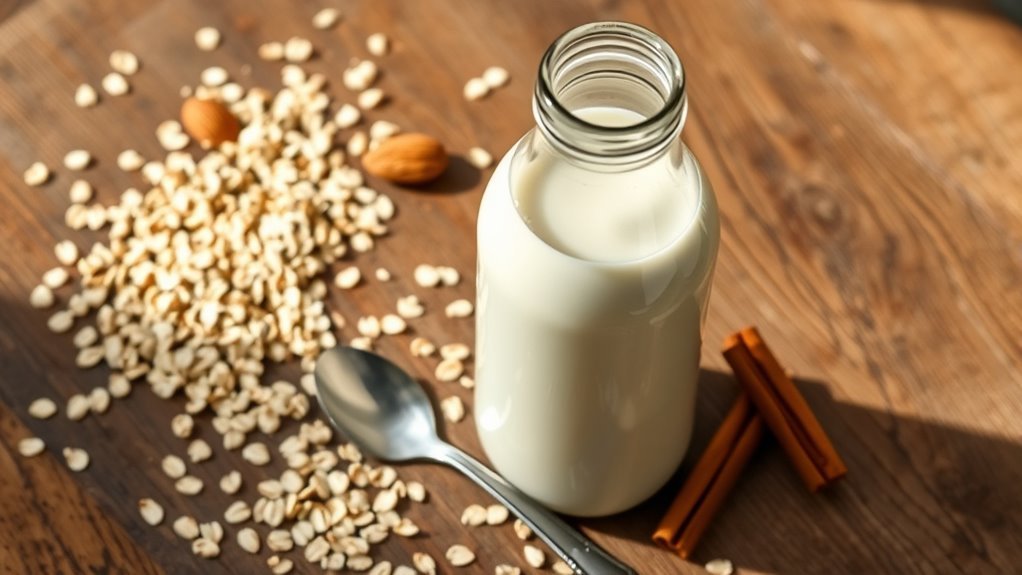Oatmeal milk isn’t keto-friendly due to its higher carbohydrate content, typically containing 15-20 grams per cup. This makes it more challenging to maintain ketosis, especially compared to low-carb milk alternatives like almond or coconut milk. Although it offers several health benefits, such as being lactose-free and rich in nutrients, the carbs can hinder your keto goals. If you’re curious about how oatmeal milk stacks up against other milk alternatives, there’s more to explore.
Understanding Oatmeal Milk: What Is It?

Oatmeal milk, a plant-based alternative to dairy, is made by blending oats with water and straining the mixture to create a creamy liquid. Its oatmeal origins trace back to ancient cultures, where oats were valued for their nutritional properties and versatility. Today, oatmeal milk stands out among various milk alternatives, offering a unique flavor profile that appeals to many consumers. It’s often chosen for its sustainability, as oats require less water to grow compared to almonds and other crops used in different milk alternatives. As more people seek options that align with their values, oatmeal milk continues to gain popularity, providing a delicious way to enjoy dairy-free beverages while supporting environmentally conscious choices.
Nutritional Profile of Oatmeal Milk

When considering oatmeal milk, it’s essential to examine its carbohydrate content and overall nutrient profile. You’ll find that oatmeal milk typically contains higher carbohydrate levels compared to other plant-based milks, which can impact its suitability for a keto diet. Additionally, understanding the vitamins and minerals it offers can help you make informed dietary choices.
Carbohydrate Content Analysis
Although many people consider oatmeal milk a nutritious alternative to dairy, it’s vital to examine its carbohydrate content to determine its suitability for a ketogenic diet. Oatmeal sourcing plays a significant role in the carbohydrate levels found in this milk alternative. Typically, a cup of oatmeal milk contains around 15-20 grams of carbohydrates, primarily derived from the oats used in its production. For those following a strict keto diet, this amount can quickly exceed daily carbohydrate limits. It’s important to compare these levels against other milk alternatives, such as almond or coconut milk, which have much lower carbohydrate content. As a result, if you’re seeking to maintain ketosis, you’ll want to approach oatmeal milk with caution.
Nutrients and Vitamins Overview
Five key nutrients are typically found in oatmeal milk, making it a remarkable option for those seeking alternatives to dairy. These include calcium, vitamin D, vitamin B12, potassium, and fiber. Calcium and vitamin D are essential for bone health, while vitamin B12 supports energy metabolism and nerve function. Potassium aids in regulating blood pressure, and fiber promotes digestive health. The oatmeal milk benefits extend beyond individual nutrients, as its composition can enhance nutrient absorption in your body. By incorporating oatmeal milk into your diet, you not only enjoy a creamy alternative but also bolster your overall nutritional profile. Understanding these nutrients can empower you to make informed choices that align with your health goals.
Carbohydrate Content and Keto Compatibility

While many people are turning to alternative milk options, understanding the carbohydrate content of oatmeal milk is essential for those following a keto diet. Oatmeal milk typically contains around 15-20 grams of carbs per cup, which can notably impact your daily carb limit on keto. For comparison, most keto-friendly alternatives, like almond or coconut milk, have only 1-3 grams of carbs per serving. If you’re seeking oatmeal milk recipes, consider using it sparingly or mixing it with these keto-friendly alternatives to keep your carb count in check. This way, you can enjoy the creamy texture of oatmeal milk without derailing your keto goals. Always check labels to verify you’re making informed choices that align with your dietary freedom.
Health Benefits of Oatmeal Milk
Oatmeal milk offers several health benefits that make it an appealing choice, even for those mindful of their carbohydrate intake. One key advantage is its high fiber content, which aids digestion and promotes a feeling of fullness, potentially helping you manage your weight. Additionally, oatmeal milk is often fortified with vitamins and minerals, providing essential nutrients like calcium and vitamin D, which are important for bone health. The presence of antioxidants in oats can also support heart health and reduce inflammation. Furthermore, it’s naturally lactose-free, making it suitable for those with lactose intolerance. Overall, the oatmeal milk benefits extend beyond taste, offering various health advantages that align well with a balanced lifestyle.
Comparing Oatmeal Milk to Other Milk Alternatives
How does oatmeal milk stack up against other popular milk alternatives? When you consider oatmeal milk comparisons, it highlights unique attributes. Here’s how it measures up:
- Almond Milk: Low in calories but often lacks protein.
- Soy Milk: High in protein but can be allergenic for some.
- Coconut Milk: Creamy and rich in flavor, yet high in saturated fats.
- Oat Milk: Offers a balance of fiber and carbs, making it a hearty choice.
In the domain of milk alternatives, oatmeal milk stands out for its creamy texture and nutritional benefits. While it may not be keto-friendly due to its carb content, it provides a satisfying option for those seeking a dairy-free lifestyle.
Incorporating Oatmeal Milk Into a Keto Diet
If you’re considering incorporating oatmeal milk into a keto diet, it’s essential to understand its carbohydrate content and how it fits within your overall macronutrient goals. Oatmeal milk is higher in carbohydrates compared to other milk alternatives, so you’ll need to use it sparingly. To enjoy oatmeal milk while staying within your keto limits, try using it in oatmeal milk recipes that balance out the carbs with low-carb ingredients, like nuts or seeds. Additionally, consider keto-friendly alternatives such as almond milk or coconut milk for your smoothies, coffee, or baking. By being mindful of portion sizes and combining oatmeal milk with other low-carb foods, you can enjoy a satisfying and nutritious diet without sacrificing your keto lifestyle.
Potential Drawbacks of Oatmeal Milk on Keto
While oatmeal milk may seem like a trendy alternative, there are several potential drawbacks to evaluate when following a keto diet. Here are a few key points to reflect on:
- Caloric Intake: Oatmeal milk can be higher in calories compared to other milk alternatives, impacting your daily caloric goals.
- Carbohydrate Content: It often contains more carbs, which can hinder your ability to stay in ketosis.
- Fiber Content: While fiber is beneficial, the type found in oatmeal milk may not sufficiently meet keto requirements for low-carb fibers.
- Nutritional Balance: It might lack essential nutrients, making it less ideal for those seeking a well-rounded keto diet.
Understanding these drawbacks can help you make more informed choices about incorporating oatmeal milk into your lifestyle.
Making Informed Choices: Oatmeal Milk and Your Diet
When considering oatmeal milk as part of your diet, it’s vital to weigh its nutritional profile against your dietary goals. Oatmeal offers several benefits, including fiber and important vitamins, but when it comes to oatmeal milk, you’ll find it typically contains added sugars and fewer nutrients than whole oats. If you’re following a keto diet, the carbohydrate content in oatmeal milk may not align with your goals. It’s important to evaluate the nutritional label, as some brands can be high in carbs. Always consider your dietary needs and how oatmeal milk fits into your overall intake. Making informed choices about oatmeal milk involves balancing its benefits with your personal dietary considerations to maintain freedom in your eating habits.
Frequently Asked Questions
Can I Make Oatmeal Milk at Home?
You can definitely make oatmeal milk at home! It’s a simple process involving blending oats with water and straining the mixture. Homemade recipes allow you to control the ingredients, ensuring you get the best oat nutrition without unnecessary additives. Just use rolled oats, and you’ll have a creamy, nutritious milk alternative. Plus, you can customize it with flavors like vanilla or cinnamon, making it perfect for your taste preferences while enjoying the benefits of oats.
Is Oatmeal Milk Safe for Lactose-Intolerant Individuals?
If you’re lactose-intolerant, oatmeal milk could be a great choice for you. It’s a lactose-free alternative, allowing you to enjoy dairy-like textures without discomfort. Nutritionally, it offers benefits such as fiber and essential vitamins while being low in fat. However, always check labels for added sugars. Overall, if you’re seeking a creamy, plant-based option, oatmeal milk fits well within your dietary needs without the risks associated with dairy.
What Brands Offer Keto-Friendly Oatmeal Milk?
When exploring oatmeal milk alternatives, you’re likely seeking options that align with keto diet compatibility. While traditional oatmeal milk may not fit the keto profile due to its higher carb content, some brands are now creating low-carb versions. Brands like Califia Farms and Ripple offer alternatives that could work for you. Always check the nutrition labels, as formulations can vary, ensuring you stick to your keto goals while enjoying delicious beverages.
Can Oatmeal Milk Be Used in Baking?
Absolutely, you can use oatmeal milk in baking! It serves as a great dairy substitute, offering a unique flavor profile. However, you might notice some texture differences compared to traditional milk. Oatmeal milk tends to be creamier, which can enhance moistness in recipes like muffins or cakes. Just keep in mind that it may alter the final outcome slightly, so experimenting with ratios could be beneficial for achieving your desired results.
How Does Oatmeal Milk Compare to Almond Milk?
Comparing oatmeal milk to almond milk is like weighing the sun against the moon; both have unique qualities. Oatmeal milk nutrition offers fiber and carbohydrates, making it more filling, while almond milk benefits include lower calories and higher vitamin E content. If you’re looking for creaminess and a heartier texture, oatmeal milk’s your friend. But for a lighter option that’s rich in antioxidants, almond milk might suit you better. Choose based on your dietary needs!
Frequently Asked Questions about Oatmeal Milk and Keto
1. Is oatmeal milk keto-friendly?
Oatmeal milk is generally not considered keto-friendly due to its higher carbohydrate content compared to other non-dairy milk alternatives. A typical serving of oatmeal milk can contain around 15-20 grams of carbs, which may exceed the daily carb limit for those following a strict ketogenic diet. For a keto diet, it’s better to opt for almond milk or coconut milk, which are lower in carbohydrates.
2. What are the carbohydrate contents of oatmeal milk?
Oatmeal milk typically contains about 15-20 grams of carbohydrates per cup, depending on the brand and whether it is sweetened or unsweetened. This carbohydrate content primarily comes from the oats used in the milk, making it less suitable for those on a keto diet, which usually restricts carbohydrate intake to around 20-50 grams per day.
3. Can I use oatmeal milk in keto recipes?
While oatmeal milk can be used in various recipes, it is not ideal for keto recipes due to its high carb content. If you choose to use it, be mindful of your total daily carbohydrate intake. For those strictly adhering to a keto diet, it is recommended to substitute oatmeal milk with low-carb alternatives like unsweetened almond milk or coconut milk.
4. Are there any health benefits to oatmeal milk?
Yes, oatmeal milk offers several health benefits. It is often fortified with vitamins and minerals, including calcium and vitamin D, which are beneficial for bone health. Additionally, oatmeal milk contains beta-glucans, a type of soluble fiber that may help lower cholesterol levels and improve heart health. However, these benefits should be weighed against its carbohydrate content if you are following a keto diet.
5. What are some low-carb alternatives to oatmeal milk?
If you’re looking for low-carb alternatives to oatmeal milk for a keto diet, consider using unsweetened almond milk, coconut milk, or macadamia nut milk. These options typically contain 1-2 grams of carbohydrates per serving and can be used in a variety of recipes without significantly impacting your carb intake. Additionally, they provide healthy fats and are often fortified with vitamins and minerals.
References
- https://www.healthline.com/nutrition/keto-diet-foods
- https://www.ncbi.nlm.nih.gov/pmc/articles/PMC7072220/
- https://www.webmd.com/diet/what-to-eat-on-keto-diet
- https://www.medicalnewstoday.com/articles/324154
- https://www.dietdoctor.com/low-carb/keto
- https://www.hhs.gov/fitness/eat-healthy/what-is-the-keto-diet/index.html
- https://www.cdc.gov/healthyweight/assessing/bmi/adult_bmi/index.html
- https://www.health.harvard.edu/staying-healthy/the-ketogenic-diet-overview-and-its-health-implications


